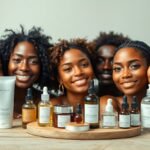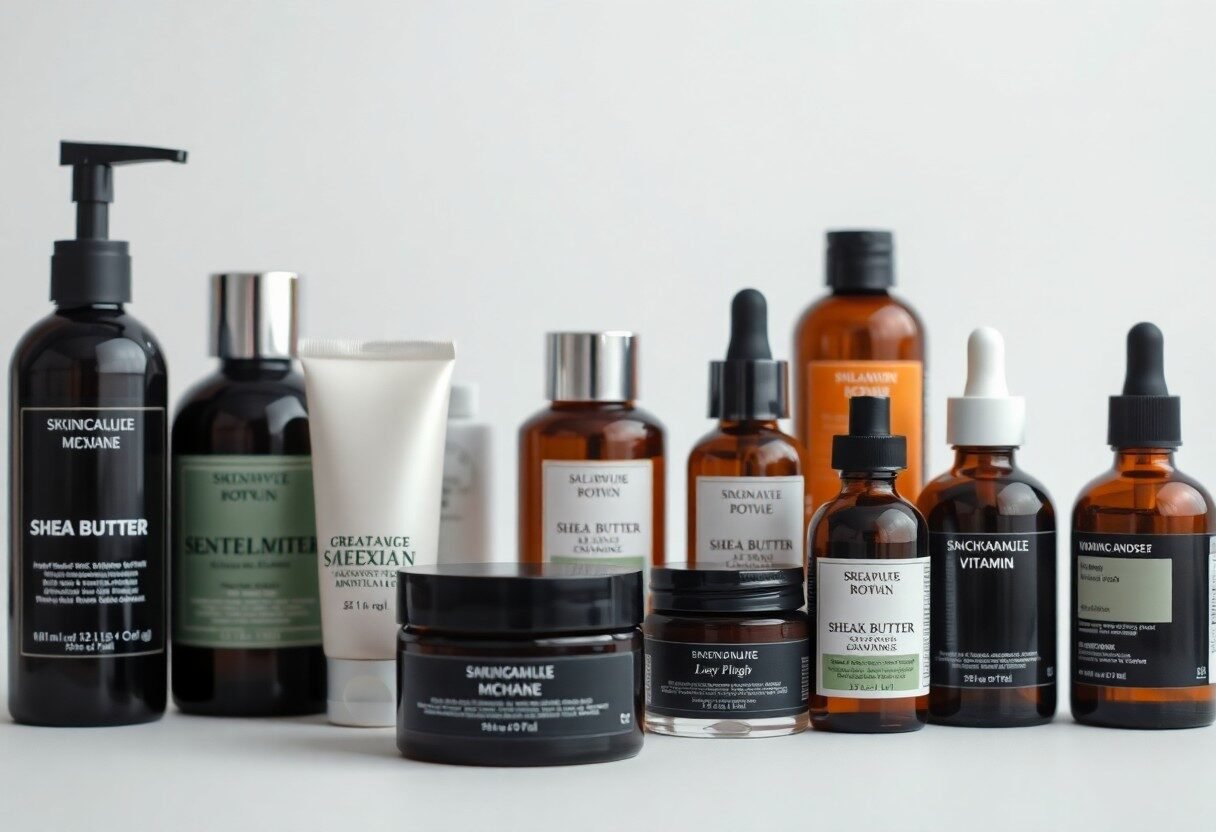
Skincare starts with understanding the unique needs of your skin. As a Black woman, it’s vital to recognize that certain ingredients can either enhance your radiant glow or lead to irritation and discoloration. In this post, I will explore into effective formulations and highlight ingredients that are beneficial, as well as those that you should avoid. Together, we will navigate the science behind skincare to empower your routine and help you achieve the healthiest skin possible.
Key Takeaways:
- Understand the unique skin needs of Black women, including melanin production and susceptibility to certain skin conditions.
- Focus on ingredients that provide hydration, such as hyaluronic acid and glycerin, to combat dryness often experienced in darker skin tones.
- Explore the benefits of vitamin C and licorice root for brightening hyperpigmentation and evening skin tone.
- Prioritize sun protection, as UV damage affects all skin types, and look for broad-spectrum SPF with at least 30 sunscreen.
- Be aware of the impact of certain herbal extracts, like tea tree oil and witch hazel, which can be beneficial for acne-prone skin.
- Conduct patch tests when trying new products to avoid adverse reactions, especially with strong active ingredients.
- Consult with dermatologists knowledgeable about Black skin to create a personalized skincare routine that addresses specific concerns.
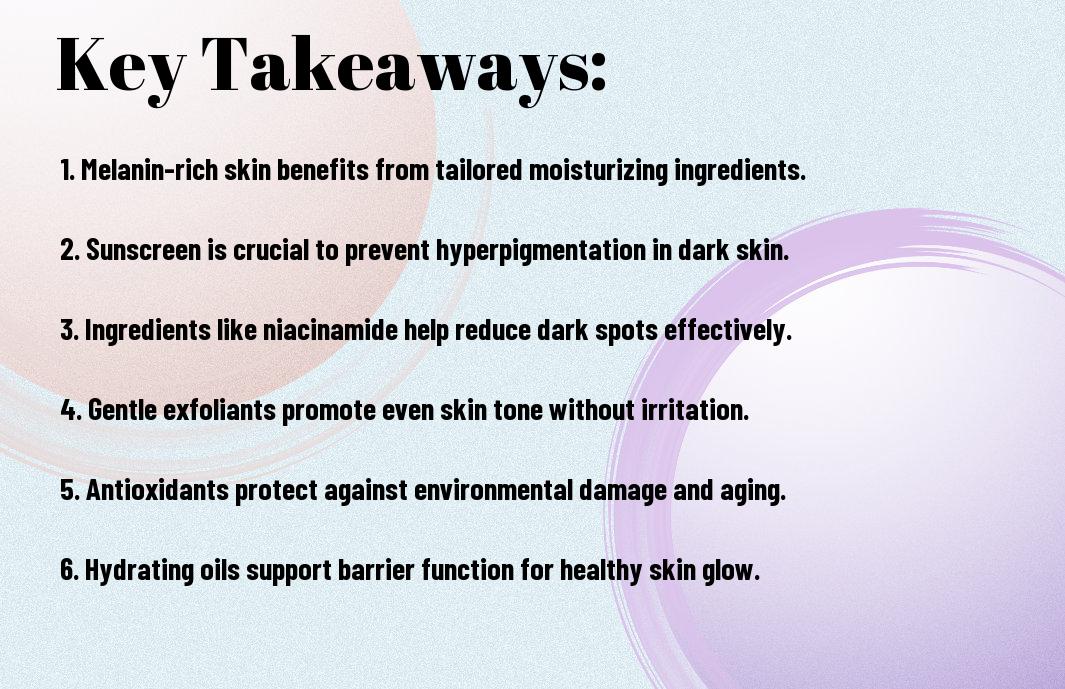
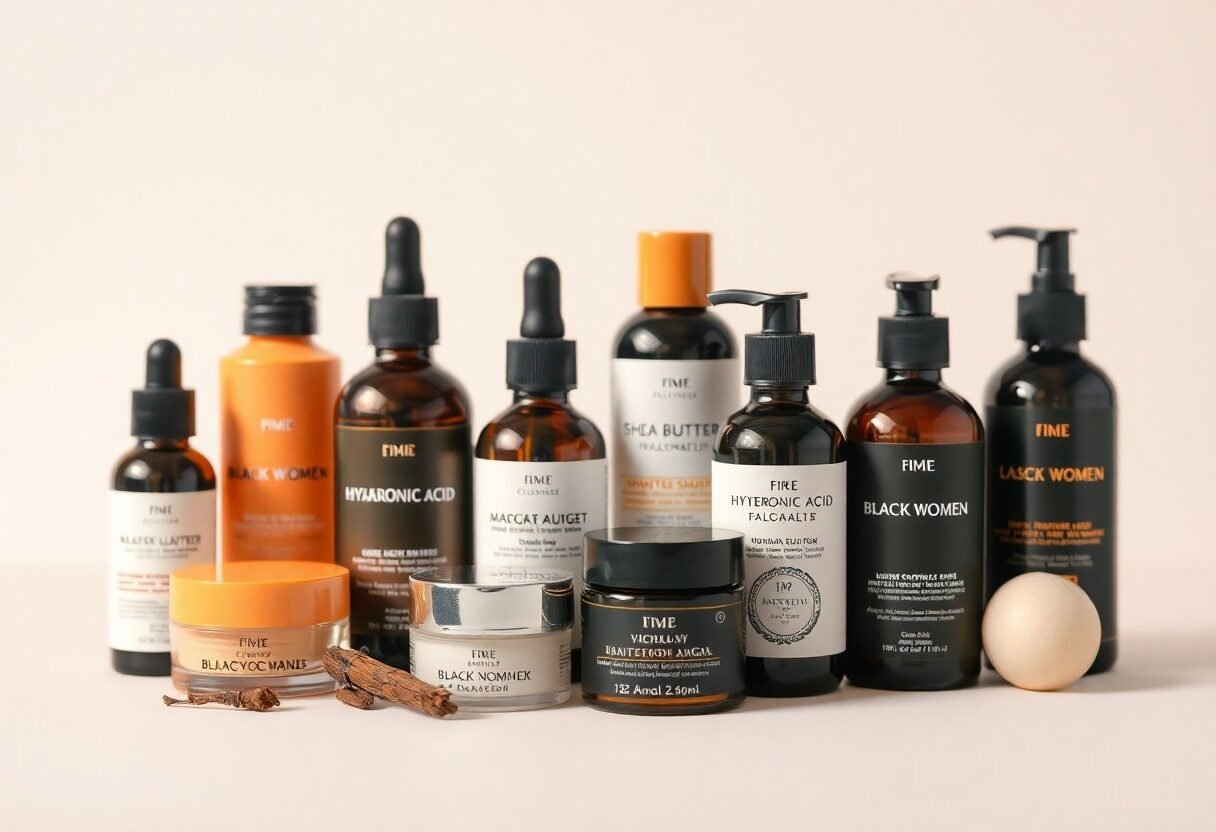
The Unique Skin Characteristics of Black Women
Melanin and Its Impact on Skin Tone
Melanin, the pigment responsible for skin color, plays a significant role in the unique characteristics of Black women’s skin. Higher melanin levels provide some degree of natural protection against UV rays, reducing the risk of sunburn and skin cancer. However, this protection can lead to a false sense of security, resulting in underestimating the importance of sun protection. People with darker skin tones may not always see the immediate effects of sun damage, which can lead to complications over time.
Common Skin Concerns: Hyperpigmentation and Acne Scarring
Hyperpigmentation and acne scarring are prevalent among Black women due to the skin’s natural response to injury. When the skin experiences trauma, such as from acne or cuts, an overproduction of melanin can occur, leading to dark spots and uneven skin tone. These concerns are often exacerbated by the fact that darker skin tones not only produce more melanin as a healing response but also tend to have an underlying sensitivity to inflammation.
Especially when acne is involved, Black women can face a challenging cycle. The inflammation caused by breakouts can trigger the skin’s healing processes, resulting in excess melanin production. Factors like hormonal fluctuations or environmental stressors can further heighten this response, making it difficult to achieve an even skin tone. Effective management typically requires a tailored approach, involving consistent skincare routines with ingredients like alpha arbutin or vitamin C to brighten the skin, alongside treating acne with salicylic acid or benzoyl peroxide. Understanding your skin’s unique responses and choosing products that specifically address these issues can lead to improved outcomes and restored confidence.
Decoding Common Skincare Ingredients
Active vs. Inactive Ingredients: What You Need to Know
Active ingredients in skincare are those that directly affect your skin’s health and appearance, like retinol or salicylic acid, while inactive ingredients serve as fillers or preservatives. Understanding this distinction helps you identify products that provide real benefits versus those that merely hydrate or act as a base for application. I often choose products with a focused set of active ingredients to target specific skin issues while being aware of any inactive components that might irritate my sensitive skin.
Key Ingredients to Look For: Vitamin C, Hyaluronic Acid, and More
Among the powerhouse ingredients to incorporate into your routine, Vitamin C, Hyaluronic Acid, and Niacinamide emerge as top contenders. Vitamin C brightens dark spots and evens skin tone, while Hyaluronic Acid ensures your skin retains moisture, vital for maintaining elasticity and firmness. Niacinamide not only helps in controlling oil production but also soothes inflammatory conditions such as acne. These ingredients are particularly beneficial for black women, addressing specific skin challenges and enhancing our natural beauty.
Including these key ingredients in your skincare arsenal can vastly improve your skin’s health. For instance, Vitamin C not only acts as a strong antioxidant that combats free radicals but has also been shown to reduce hyperpigmentation, a common concern. Hyaluronic Acid’s ability to hold up to 1,000 times its weight in water makes it invaluable for maintaining hydration in your skin, which may be more prone to dryness in drier climates. Niacinamide works wonders by stabilizing your skin’s barrier, ensuring a smoother, more resilient complexion. By integrating these ingredients into your daily routine, you’re investing in the long-term health and vibrancy of your skin.
The Importance of Moisturization for Melanin-Rich Skin
Choosing the Right Moisturizer: Oil-Based Vs. Water-Based
For melanin-rich skin, understanding whether to choose an oil-based or water-based moisturizer can make a substantial difference in hydration levels. Oil-based moisturizers often provide a protective barrier that locks in moisture, making them ideal for drier skin types. Conversely, water-based moisturizers are lighter and absorb quickly, benefiting those with oily or combination skin. Assessing your skin type will guide your decision, ensuring optimal hydration tailored to your needs.
The Role of Humectants and Emollients in Hydration
Humectants and emollients play distinctive but complementary roles in keeping your skin well-hydrated. Humectants, such as glycerin and hyaluronic acid, draw moisture from the environment into your skin, enhancing hydration levels. Emollients, like shea butter and jojoba oil, not only provide a smooth texture but also help to fill in gaps between skin cells, promoting softness and elasticity. For melanin-rich skin, a thoughtful combination of both is imperative to maintain hydration and prevent dryness.
Choosing products with a well-rounded blend of humectants and emollients can make a discernible difference. For instance, using a moisturizer that contains hyaluronic acid as a humectant alongside emollients like cocoa butter can deeply hydrate while protecting the skin’s barrier. This dual action prevents transepidermal water loss, a common issue for many, especially in harsher climates. Ultimately, finding the right balance can help ensure that your skin remains plump, rejuvenated, and beautifully vibrant.
Sun Protection: A Crucial Yet Overlooked Step
Understanding SPF: What Is Enough for Darker Skin Tones?
In terms of SPF, many believe that darker skin doesn’t need much protection, but that’s a misconception. I recommend using a broad-spectrum sunscreen with at least spf 30 for everyday use, regardless of your skin tone. This level of protection significantly reduces the risk of sun damage that can lead to issues like hyperpigmentation and premature aging. Even with higher melanin levels, UV rays can still cause harm, so consistent application is key.
Myths Surrounding Sun Exposure and Skin Damage
Many people assume that darker skin is naturally protected from sun damage, which is simply not true. This myth can lead to a false sense of security and result in a lack of sun protection. Even though I have higher melanin, UV rays can penetrate deeper and still cause repercussions that aren’t always immediately visible, such as skin cancer and collagen breakdown. By dismissing the need for sun protection, important damage may be silently accumulating beneath the surface.
Believing that darker skin is invulnerable to sun damage is a serious misconception I often encounter. While the increased melanin provides some degree of protection against UV rays, it doesn’t render us completely safe. In fact, studies reveal that Black women are often diagnosed with skin cancer at a later stage due to this misunderstanding. Additionally, hyperpigmentation caused by sun exposure can be more pronounced in darker skin tones, making sun protection necessary in maintaining an even complexion. As you develop your skincare routine, incorporating sun protection should be non-negotiable, regardless of skin tone.
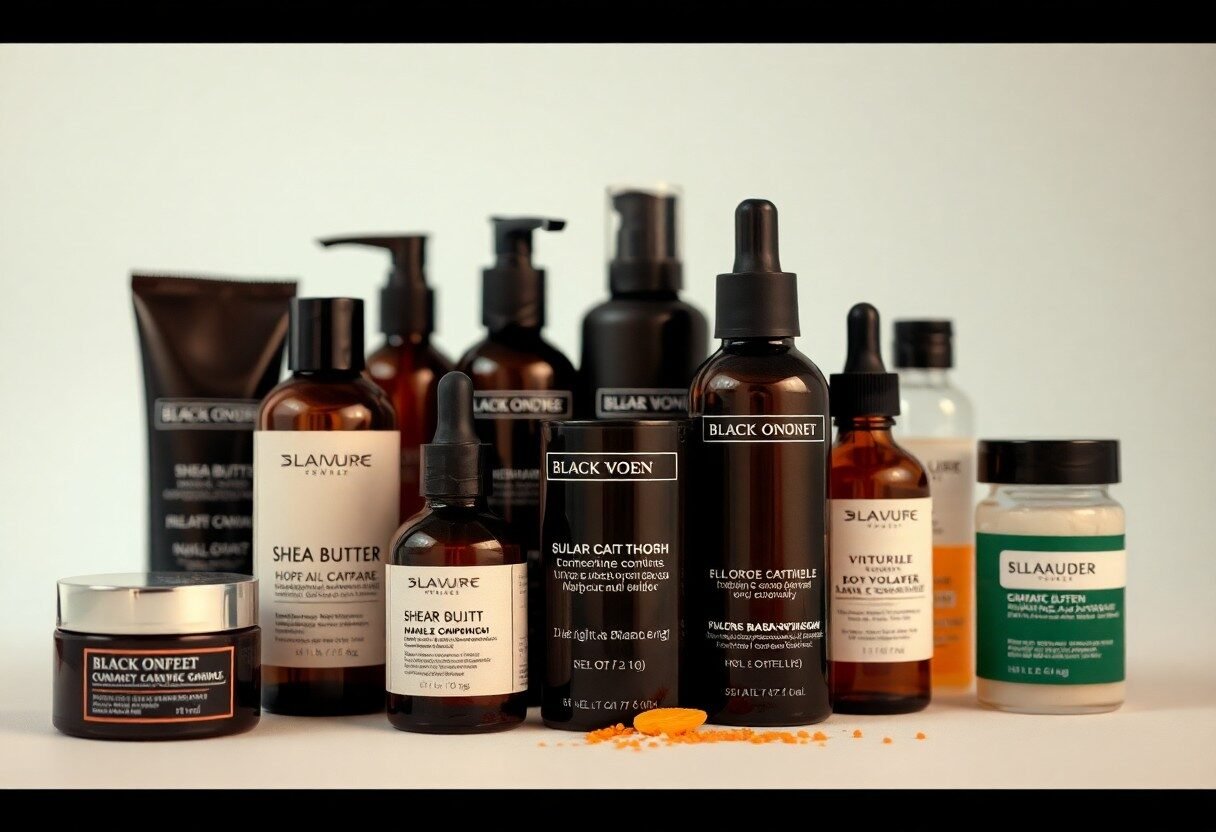
Unveiling the Truth About Exfoliation
Chemical vs. Physical Exfoliation: What Works Best?
Chemical exfoliation uses active ingredients like alpha hydroxy acids (AHAs) and beta hydroxy acids (BHAs) to dissolve dead skin cells, while physical exfoliation involves manually scrubbing the skin with granules or tools. Both methods can be effective, but I find that chemical exfoliants tend to provide a deeper and more even exfoliation, especially beneficial for my skin. They can also be gentler, reducing the risk of microtears that may occur with aggressive scrubbing, which is something I always want to avoid.
How Often Should You Exfoliate Based on Skin Type?
The frequency of exfoliation largely depends on your skin type. For instance, if your skin is oily or acne-prone, I recommend exfoliating up to three times a week. Normal skin can benefit from twice-weekly sessions, whereas those with dry or sensitive skin may only need to exfoliate once weekly to avoid irritation. Finding that sweet spot is vital for maintaining balance.
For oily or acne-prone skin, I usually opt for BHAs that penetrate deeper to unclog pores and reduce breakouts. By exfoliating three times a week, I can manage excess oil without compromising the skin’s barrier. If my skin is normal, twice a week feels just right, while my friends with dry or sensitive skin might confirm that weekly sessions keep their complexion radiant without causing irritation. Adjusting your routine based on response is key—listen to your skin and adapt accordingly for the best results.
Building a Personalized Skincare Routine
The Steps of an Effective Routine: From Cleansing to Treatment
An effective skincare routine should be systematic, starting with cleansing to remove dirt and impurities, followed by toning to balance your skin’s pH, and then applying serums that target specific concerns like hyperpigmentation or dryness. After that, a moisturizer seals in hydration while a broad-spectrum sunscreen protects against UV damage during the day. For nighttime, you might swap sunscreen for a nourishing night cream or treatment. Each step complements the next, creating a holistic approach to preserving and enhancing your skin’s health.
Understanding Your Skin Type: Oily, Dry, Combination, or Sensitive
Identifying your skin type is fundamental to choosing the right products. Oily skin tends to have excess sebum production, often leading to acne and enlarged pores. Dry skin can feel tight and may flake, indicating a need for richer moisturizers. Combination skin exhibits characteristics of both oily and dry areas, requiring a balanced approach. Sensitive skin is prone to redness and irritation, necessitating gentle formulations with fewer irritating ingredients. Knowing your skin type allows you to tailor your skincare routine effectively.
To further elaborate, oily skin may benefit from lightweight gel-based products that won’t clog pores, while those with dry skin should seek out formulations rich in hyaluronic acid or ceramides for maximum hydration. Combination skin needs targeted approaches; you might use a mattifying product on the oily zones and a creamier moisturizer on drier areas. Sensitive skin should prioritize fragrance-free, hypoallergenic ingredients to minimize the risk of flare-ups. The key lies in observing how your skin reacts to different products, allowing you to adjust as needed.
Holistic Approaches to Skincare
The Impact of Diet and Nutrition on Skin Health
A balanced diet rich in vitamins and minerals can transform your skin. I’ve found that foods high in antioxidants, like berries, and healthy fats, such as avocados and walnuts, nourish your skin from the inside out. Nutrients like vitamins A, C, and E are particularly beneficial in combating hyperpigmentation, a common skin concern for many Black women. Incorporating these elements into your daily meals not only enhances skin vitality but can also contribute to more radiant, youthful-looking skin.
Stress Management and Its Effect on Skin Conditions
Chronic stress can wreak havoc on your skin, leading to flare-ups and conditions like eczema and acne. I’ve observed that when my stress levels rise, my skin often reflects that turmoil, demonstrating the tangible connection between emotional wellbeing and physical appearance. Managing stress through mindfulness techniques or activities like yoga and gentle exercise can significantly improve skin conditions over time.
Skin issues can often serve as an external manifestation of internal stress. The body releases cortisol during stressful periods, which may lead to increased oil production and clogged pores, escalating acne development. Additionally, the inflammatory response triggered by stress can result in conditions such as psoriasis and eczema becoming more aggressive. A multifaceted approach that incorporates stress-relief practices, plenty of sleep, and proper hydration has proven to not only help me feel better but also alleviate skin stressors, leading to clearer skin.
Cultural Influences on Skincare Practices
Traditional Skincare Remedies from the African Diaspora
Many traditional skincare practices have been passed down through generations within the African diaspora. Ingredients such as shea butter, baobab oil, and black soap play significant roles in nurturing and protecting the skin. For example, shea butter is celebrated not just for its moisturizing properties but also for its anti-inflammatory effects, making it perfect for various skin types. These time-honored remedies reflect a deep connection to cultural heritage and emphasize the importance of natural resources in skincare regimens.
How Community and Family Shape Skincare Choices
Your skincare decisions are often influenced by the advice and traditions passed down within your family and community. Growing up, I often absorbed tips from women in my family—mothers, grandmothers, and aunts who shared their wisdom about effective products and practices. Whether it’s using coconut oil for hydration or learning about the importance of sun protection, these insights form a foundation for our approaches to skincare.
Family gatherings often serve as a rich tapestry of shared beauty secrets and traditions, where everybody swaps stories about their skincare journeys. For instance, you might recall the stories of relatives using natural clay masks or celebrating a product that helped a friend’s skin glow. These practices create a sense of trust and understanding of what works for your specific skin type while also fostering a community bond. This collective awareness shapes not only the products you choose but also the way you view beauty and self-care, making it a deeply embedded community experience with cultural significance.
To wrap up
Taking this into account, understanding the science of skincare and the unique needs of Black women can significantly enhance your beauty regimen. By familiarizing yourself with beneficial ingredients and their effects on your skin, you empower yourself to make informed choices that nurture your complexion. I encourage you to explore products that cater to your specific skin type and concerns, prioritizing hydration and protection. Your skin deserves the best, and with the right knowledge, you can achieve a radiant and healthy glow that reflects your individuality.
FAQ
Q: What are some common ingredients found in skincare products that are beneficial for Black women?
A: Some beneficial ingredients for Black women include hyaluronic acid, which helps hydrate and plump the skin, and niacinamide, known for its brightening and texture-refining properties. Additionally, shea butter and jojoba oil are excellent for moisturizing and helping to lock in hydration, while vitamin C can aid in evening skin tone and reducing hyperpigmentation.
Q: How do I choose the right sunscreen for my skin type?
A: When deciding on sunscreen, look for broad-spectrum protection with an SPF of 30 or higher. For oily or acne-prone skin, gel-based or oil-free formulas are ideal, while cream-based sunscreens work well for dry skin types. Additionally, consider tinted sunscreens as they can provide extra coverage against hyperpigmentation.
Q: What should I look for if I have hyperpigmentation?
A: If you’re dealing with hyperpigmentation, ingredients like alpha arbutin, vitamin C, and licorice root extract can help brighten the skin and reduce dark spots. Exfoliating acids, such as glycolic acid or lactic acid, can promote skin cell turnover, which is beneficial for fading hyperpigmentation over time.
Q: How can I effectively layer skincare products?
A: Effective layering starts with applying products from thinnest to thickest consistency. Begin with a cleanser, followed by a toner, serums, and then moisturizers. Finish with sunscreen in the morning or an oil at night to seal in moisture. Always allow each product to absorb before applying the next for the best results.
Q: Are there specific ingredients I should avoid?
A: Black women with sensitive or reactive skin should avoid harsh ingredients such as alcohol, fragrances, and sulfates that can lead to irritation. Additionally, products containing artificial dyes or synthetic preservatives may not be suitable for all skin types. Always patch-test new products to check for adverse reactions.
Q: How often should I exfoliate my skin?
A: Exfoliating 1-2 times a week is generally sufficient for most skin types. However, if you have sensitive skin, it’s best to limit exfoliation to once a week to avoid irritation. Chemical exfoliants, such as AHAs and BHAs, tend to be gentler than physical scrubs and can be incorporated into your routine based on your skin’s tolerance.
Q: What is the importance of a consistent skincare routine?
A: Consistency in your skincare routine is important for achieving and maintaining healthy skin. Regular use of products that address specific concerns, such as hydration, pigmentation, or aging, allows the active ingredients to work effectively over time. Establishing a daily routine tailored to your skin type can lead to noticeable improvements in skin health and appearance.
